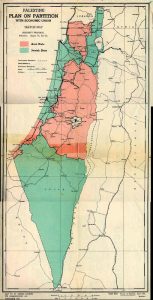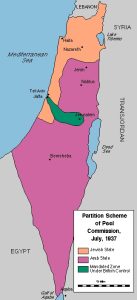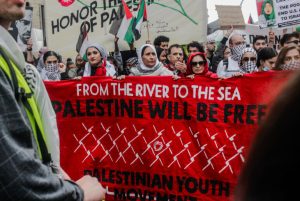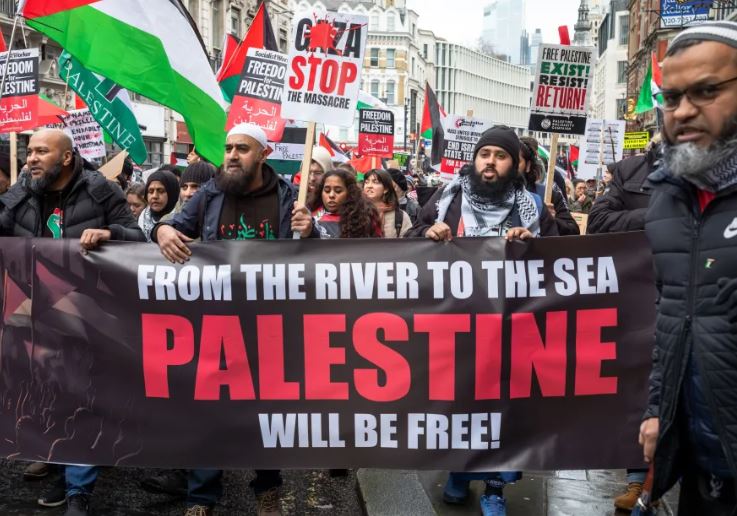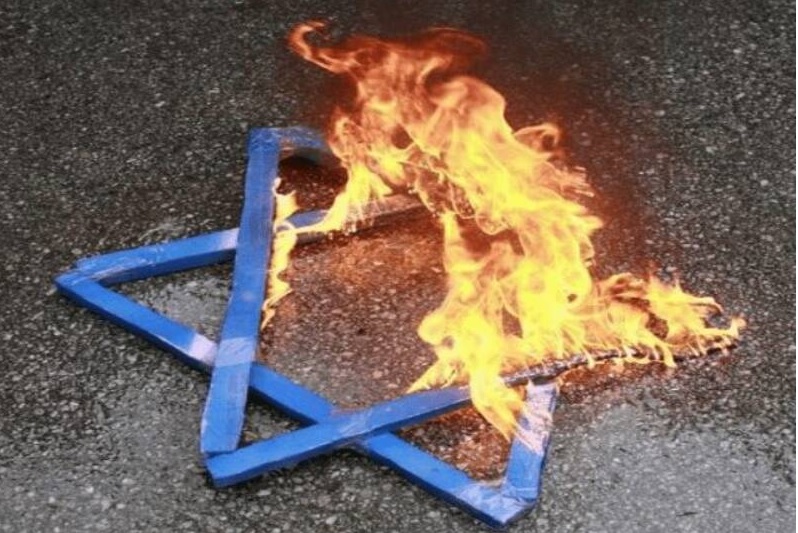Below is a transcript of an interiew of Bhikkhu Bodhi by Mary Thanissara. The interview appears to have been heavily edited before it was released on youtube as part of a 100+ minute long online Israel-bashing session hosted by the “Sacred Mountain Sangha” on June 9th.
There are at least four notable things about the interview. The first is the extensive, and rather clumsy editing. It would be nice to hear the entirety of what Bhikkhu Bodhi actually had to say.
The second thing is that while Bhikkhu Bodhi encourages Buddhists to join in anti-Israel protests, he feels compelled to add “as I said some of them make me feel a bit uncomfortable with some of these chants.” This implies that Bodhi had previously, in the course of the same interview, been more specific about which “chants” made him feel “uncomfortable”. Since that part of the interview has been edited out, though, we are left to guess whether the chants in question were “From the River to the Sea!”, or possibly, “We Are Hamas!”, or possibly “Khaybar, Khaybar!”, or possibly something else?
The third thing is that one of the most heavily edited parts of the interview (with at least 4 edits in just over 1 minute) is where Bhikkhu Bodhi explicitly refers to a cease fire. It’s important to look at what Bodhi said about a cease fire in another interview he did in the same month as Thanissara’s interview with him:
First, we must persuade both Israel and Hamas to agree to a complete ceasefire, an end to hostilities to go into immediate effect, including release of the hostages held by Hamas as part of the deal. [From: “Buddhist Ethics for a World in Crisis”, Insight Journal, June 2024, emphasis in original]
In Thanissara’s interview with Bhikkhu Bodhi, or at least in the parts she decided to make public, Bhikkhu Bodhi never mentions Hamas or the hostages, nor does he mention October 7th. In the other interview he did in the same month he mentions Hamas six times, the hostages twice, and October 7th three times. We are left with two possibilities: either Bodhi did mention Hamas, the hostages, and October 7th in the interview with Thanissara and she decided to edit that out, or, alternatively, sometimes Bhikkhu Bodhi bothers to mention Hamas, the hostages, and October 7th when talking about a cease fire, and sometimes he doesn’t.
The fourth thing is that toward the end of the interview, Bodhi specifically endorses two anti-Israel organizations, Jewish Voice for Peace, and IfNotNow, and in doing so justifiies his endorsement by asserting that these two groups “take sort of balanced, well considered, strong but moderate approaches”. We are left wondering what makes the “approaches” of these two groups more “balanced”, “well considered”, and “moderate” than other (unnamed) groups. It would be very helpful to know what other groups do not receive Bhikkhu Bodhi’s seal of approval for being insufficiently balanced, well considered, and moderate. It’s also worth noting, along these lines, that while Bodhi does endorse anti-Israel “protest marches” and “demonstrations” he makes no mention of “encampments” and campus building seizures that have been such a prominent feature of anti-Israel activism since October 7.
In the transcipt below all of the obvious places where parts of the original interview were edited out are marked prominently with (SNIP SNIP SNIP).
Th (Thanissara): What do we need to understand, practice, to do to build a more vibrant activist, it’s like linking the inner work of liberation …
BB (Bhikkhu Bodhi): Yeah
Th: … with liberation from these systems of oppression, to build that bridge.
BB: Yeah (SNIP SNIP SNIP) Often what draws people initially to the dharma is they’re dealing with inner problems within themselves, either psychological conflicts or just a general sense of dissatisfaction with their lives, with their relationships, and so often they relate to Dharma almost as a kind of, I wouldn’t say a psychotherapy, but maybe a kind of existential therapy. And then others who approach Buddhism through maybe a more traditional lens do take it as a path to enlightenment and liberation. And so in this way they’re appropriating Dharma against what I would call a largely a traditionalist background. And I think what has to be understood is that culture and religion goes through different stages of development, and sometimes we have to transform the religion to meet the particular needs of the time (SNIP SNIP SNIP) The main thrust of traditional Buddhism is on personal inner cultivation, of course ethical relationships in one’s everyday life, but mainly inner cultivation aimed at some kind of insight, enlightenment, liberation, and liberation from suffering is understood as liberation from the inner suffering, the suffering that comes from psychological suffering and from the general suffering, the existential suffering of samsara. It seems to me a sort of a pressing need of our own time is to expand our understanding of the Dharma beyond those narrow confines that come from the traditional background and to see a Dharma, a kind of a integral Dharma, a Dharma that extends both to the social domain in which we’re living in a very active and even forceful way, and also a Dharma that’s concerned with preserving our natural environment. So this, we see coming to manifestation with what’s called now eco-Dharma and Buddhist environmentalism (SNIP SNIP SNIP) So we have to broaden the expanse of our understanding of the Dharma to extend it into all these different dimensions of our life: political, social, economic, and environmental, as well as the personal and immediately social (SNIP SNIP SNIP) Yet here what I would say is what we need I call it a searing sense of a Buddhist conscience which is guided by a kind of vision of what kind of a world do we want? Do we want a world in which countries are able to attack other countries and just bombard them. And the particular situation in Gaza is just so horrific and just completely repellent to the conscience, because the main victims, like 90% of the victims are not, this isn’t a combat situation, where one army is confronting another army, or confronting the bases of another army, but this is a case where the victims are an entire population, the population of Gaza, which has been under a kind of occupation (SNIP SNIP SNIP) But now just the most horrific assault has been launched which has no constraints at all, no moral constraints, and this is, should be completely repellent to our moral consciousness and should just mobilize any person of conscience to act. But it seems that there’s a kind of, I have to say, a weak sense of a Buddhist moral consciousness, a Buddhist moral conscience, and that’s where I think we have to, again, expand that understanding of what it means to be a follower of Buddhist ethics, where we have to develop a sense of responsibility for the world, a mind that takes, that has concern for the wellbeing of the world. And particularly when we see one country attacking another, an occupied territory to a degree that could be well classified as genocide. This should stir up a strong sense of repugnance and a compulsion to act to do something [18:19] (SNIP SNIP SNIP) An unavoidable, absolutely essential starting point has to be a complete and unconditional cease fire, just stop the killing, stop the destruction, and let us at least begin some kind of negotiations, as difficult as they would be (SNIP SNIP SNIP) Of course a big problem here this has to deal with the dynamics of the American political scene (SNIP SNIP SNIP)
Th: You know while they’re talking on the one hand Biden like (inaudible)
BB: Yeah this is the US, yeah, yeah, a billion dollars, yeah, yeah.
Th: The US is completely underwriting now and actively colluding in what is a genocide.
BB: Yeah, and this is what really makes this situation so tragic from the standpoint of the United States, because we have become with Israel, hypocritical on our part. We’ve always been presenting ourself as the defender, the primary global defender of the international rules-based order (SNIP SNIP SNIP) Yet now the rest of the world is standing up and coming to support of the cease fire at the UN, the proposal to make Palestine, to recognize Palestine as a state. [19:35] Pretty much three-quarters of the world has already done that, the other countries are ready to do it. And so we’re becoming a kind of pariah, the antithesis, the chief underminer and opponent of the international rules-based order (SNIP SNIP SNIP) Like could we as Dharma practitioners
Th: This is what I want to ask, yeah (SNIP SNIP SNIP)
BB: Um, you know like one thing that could be done is to join these these protest marches, these demonstrations, [20:02] though as I said some of them make me feel a bit uncomfortable with some of these chants. Or one can, I would say, it would be good for Buddhists to maybe to, who have that need to do something, to join organizations like Jewish Voice for Peace, you don’t have to be Jewish to join.
Th: Right you don’t
BB: I’m a member, too. I’ve become a member as a Buddhist not as somebody of Jewish ethnicity. Yeah, and so I think Jewish Voice for Peace, IfNotNow, take sort of balanced, well considered, strong but moderate approaches (SNIP SNIP SNIP) One of the major sort of terrible aspects of Israel’s campaign against Gaza is not only the bombardments and the destruction of all of the infrastructure, but also this very, very rigorous blockade that Israel has imposed on Gaza. It’s virtutally a total blockade (SNIP SNIP SNIP) Children who are just their bodies reduced to skin and bones, do write to one’s Congressional representatives, and send this to express your dismay at Israel’s actions in Gaza and to insist that they adopt policies that will in some way change the course of events in Gaza, and the West Bank, we shouldn’t lose sight of the West Bank (SNIP SNIP SNIP) You could also look into your University, if you could find out something about your Alma Mater, find out their finances, see if they are engaged in financial support to the Israeli military, and insist that they divest from those investments (SNIP SNIP SNIP)
Th: Excellent
BB: Actions we can take in the visible realm.Meditation on compassion, and praying for peace. You can recite the name of Guan Yin Bodhisattva, other great Bodhisattvas, and dedicate the merit to the Dharma protecting Deities, sort of imploring them to intercede on behalf of the human community here on this planet earth (SNIP SNIP SNIP) Certainly you should take the concrete action in this world, but I believe that beyond the visible plane there’s also a kind of collective psychic plane, which is permeated by our thoughts, our intentions, our wishes, our aspirations, our prayers, our hopes, and so forth. And it’s possible that when these reach a certain threshold of saturation with benevolent wishes, this could trigger changes in the visible plane, by making a subtle invisible impact on the thought processes of the global leaders, or even causing material changes that could bring about major transformations in the social sphere (SNIP SNIP SNIP)
Th: Thank you
BB: And so we should use all of these, both concrete, visible acts, actions in the visible plane, and also permeating the psychic plane with our meditations, aspirations, recitations, and so on (SNIP SNIP SNIP)
Th: Thank you so much, thank you, thank you.
BB: Yeah
Th: Bye bye now.
BB: OK.
Th: Bye
The interview with Bhikkhu Bodhi starts at about 13 minutes and 23 seconds into the below youtube video:

(Photo: David Cliff/Anadolu Agency via Getty Images) https://www.commondreams.org/news/2021/05/22/nearly-200000-gather-london-history-making-demonstration-solidarity-palestinians
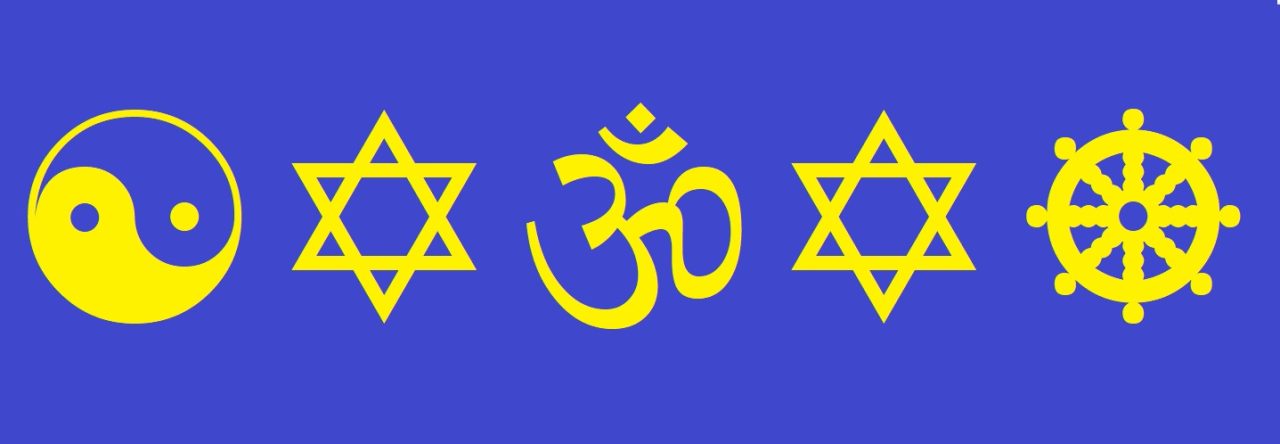

 First off, there is the ludicrous title. It sounds like something you’d find on the cover of an L. Ron Hubbard novel, or maybe on the case of a Marvel Avengers video game.
First off, there is the ludicrous title. It sounds like something you’d find on the cover of an L. Ron Hubbard novel, or maybe on the case of a Marvel Avengers video game.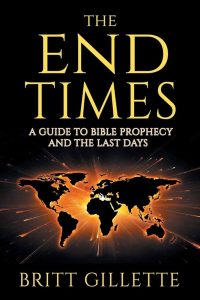 In terms of any actual Buddhist content, there simply is none. Where there purports to be Dharma there is only moral grandstanding and knee-jerk anti-imperialist, jihadist-adjacent political sloganeering.
In terms of any actual Buddhist content, there simply is none. Where there purports to be Dharma there is only moral grandstanding and knee-jerk anti-imperialist, jihadist-adjacent political sloganeering.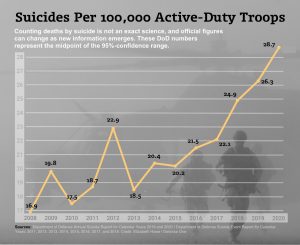 But what does Thanissara really know about Aaron Bushnell? Does she know that most of his life was spent in an abusive cult? Does she know that he openly supported Hamas as an “anti-colonial resistance organization” and publicly declared his approval of the rape, murder, and kidnapping of Israeli civilians on October 7? In other words, does she realize that he was a psychologically damaged young man obsessed with violent antisemitic ideas? It is very likely that Thanissara does not know this. After all, she couldn’t even quote his dying words accurately!
But what does Thanissara really know about Aaron Bushnell? Does she know that most of his life was spent in an abusive cult? Does she know that he openly supported Hamas as an “anti-colonial resistance organization” and publicly declared his approval of the rape, murder, and kidnapping of Israeli civilians on October 7? In other words, does she realize that he was a psychologically damaged young man obsessed with violent antisemitic ideas? It is very likely that Thanissara does not know this. After all, she couldn’t even quote his dying words accurately!